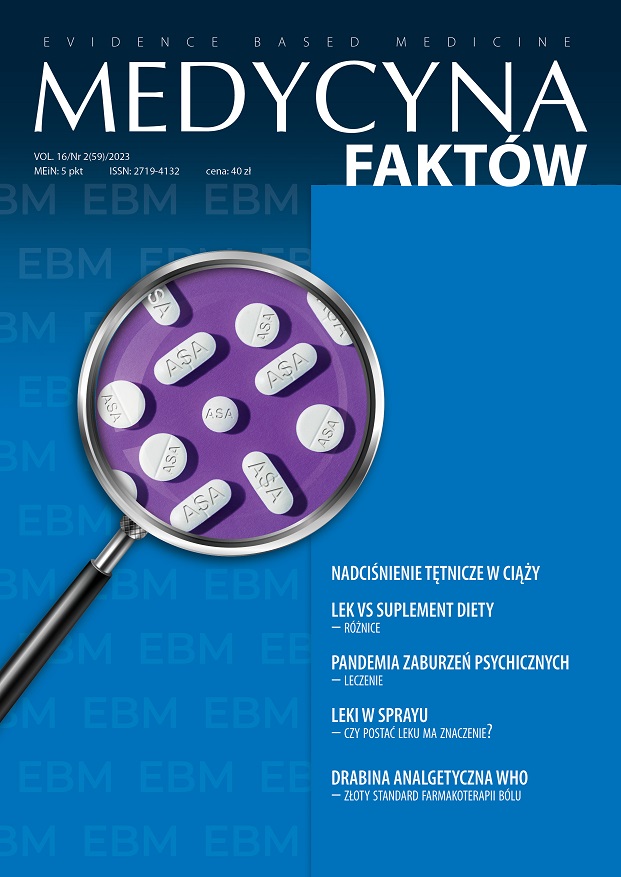Glicyna ? aminokwas endogenny o właściwościach plejotropowych Artykuł przeglądowy
##plugins.themes.bootstrap3.article.main##
Abstrakt
Glicyna jest aminokwasem endogennym zaangażowanym w wiele procesów fizjologicznych. Badania wykazały jej działanie przeciwzapalne, immunomodulujące i cytoprotekcyjne, co próbuje się wykorzystywać w praktyce klinicznej. Mechanizm działania nie został dokładnie poznany, ale wiele efektów glicyny wynika z hamowania procesów zależnych od jonów wapnia. Suplementacja tym aminokwasem może się okazać korzystna w przebiegu takich chorób, jak: zespół metaboliczny, nieswoiste zapalenie jelit czy mukowiscydoza. Dołączenie glicyny do kwasu acetylosalicylowego podawanego doustnie w ramach terapii przeciwpłytkowej znacząco poprawia tolerancję preparatu. Efekt plejotropowy, który wywiera na organizm ludzki, może w przyszłości przyczynić się do szerszego wykorzystania glicyny w lecznictwie.
##plugins.themes.bootstrap3.article.details##
Copyright by Medical Education. All rights reserved.
Bibliografia
2. Newgard CB, An J, Bain JR et al. A branched-chain amino acid-related metabolic signature that differentiates obese and lean humans and contributes to insulin resistance. Cell Metabol. 2009; 9: 311-26.
3. Guasch-Ferré M, Hruby A, Toledo E et al. Metabolomics in prediabetes and diabetes: a systematic review and metaanalysis. Diabetes Care. 2016; 39: 833-46.
4. Li X, Sun L, Zhang W et al. Association of serum glycine levels with metabolic syndrome in an elderly Chinese population. Nutr Metab. 2018; 15: 89.
5. Rom O, Liu Y, Liu Z et al. Glycine-based treatment ameliorates NAFLD by modulating fatty acid oxidation, glutathione synthesis, and the gut microbiome. Sci Transl Med. 2020; 12: eaaz2841.
6. Ding Y, Svingen GFT, Pedersen ER et al. Plasma glycine and risk of acute myocardial infarction in patients with suspected stable angina pectoris. J Am Heart Assoc. 2015; 5: e002621.
7. Wittemans LBL, Lotta LA, Oliver-Williams C et al. Assessing the causal association of glycine with risk of cardiometabolic diseases. Nat Commun. 2019; 10: 1060.
8. Zhong Z, Wheeler MD, Li X et al. L-Glycine: a novel antiinflammatory, immunomodulatory, and cytoprotective agent. Curr Opin Clin Nutr Metab Care. 2003; 6: 229-40.
9. Yang Z, Liao SF. Physiological Effects of Dietary Amino Acids on Gut Health and Functions of Swine. Front Vet Sci. 2019; 6: 169.
10. Koopman R, Caldow MK, Ham DJ et al. Glycine metabolism in skeletal muscle: implications for metabolic homeostasis. Curr Opin Clin Nutr Metab Care. 2017; 20(4): 237-42.
11. Ham DJ, Gardner A, Kennedy TL et al. Glycine administration attenuates progression of dystrophic pathology in prednisolone-treated dystrophin/ utrophin null mice. Sci Rep. 2019; 9: 12982.
12. Vieira CP, Prado De Oliveira L, Da Ré Guerra F et al. Glycine Improves Biochemical and Biomechanical Properties Following Inflammation of the Achilles Tendon. Anat Rec. 2015; 298: 538-45.
13. Howard A, Hirst BH. The Glycine Transporter GLYT1 in Human Intestine: Expression and Function. Biol Pharm Bull. 2011; 34(6): 784-8.
14. Stoffels B, Türler A, Schmidt J et al. Anti-Inflammatory Role of Glycine In Reducing Rodent Postoperative Inflammatory Ileus. Neurogastroenterol Motil. 2011; 23(1): 76-e8.
15. Yang Y, Fan X, Ji Y et al. Glycine represses endoplasmic reticulum stress-related apoptosis and improves intestinal barrier by activating mammalian target of rapamycin complex 1 signaling. Anim Nutr. 2022; 8: 1-9.
16. Effenberger-Neidnicht K, Jägers J, Verhaegh R et al. Glycine selectively reduces intestinal injury during endotoxemia. J Surg Res. 2014; 192(2): 592-8.
17. Vargas MH, Del-Razo-Rodríguez R, López-García A et al. Effect of oral glycine on the clinical, spirometric and inflammatory status in subjects with cystic fibrosis: a pilot randomized trial. BMC Pulm Med. 2017; 17: 206.
18. Imenshahidi M, Hossenzadeh H. Effects of glycine on metabolic syndrome components: a review. J Endocrinol Invest. 2022; 45(5): 927-39.
19. Kusche W, Paxinos R, Haselmann J et al. Acetylsalicylic acid tablets with glycine improve long-term tolerability in antiplatelet drug therapy: results of a noninterventional trial. Adv Ther. 2003; 20(5): 237-45.
